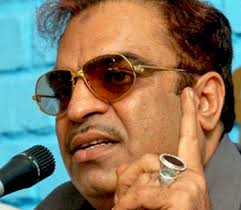Mysuru, Oct 22: At a time when the dust raised by former minister V Srinivasa Prasad's resignation is yet to settle, senior Congress leader and Planing Commission vice-chairman C M Ibrahim has made public his resentment against Chief Minister Siddaramaiah.
 He said Siddaramaiah has failed to perform to people's expectations and felt that people will rate the performance of the governance in the coming elections. Stating that recent developments in the party has hurt him, Ibrahim said, “People are aware of what is going on around them and it is not possible to cheat people for a long time. A day will come when people will give them a befitting reply.”
He said Siddaramaiah has failed to perform to people's expectations and felt that people will rate the performance of the governance in the coming elections. Stating that recent developments in the party has hurt him, Ibrahim said, “People are aware of what is going on around them and it is not possible to cheat people for a long time. A day will come when people will give them a befitting reply.”
Asked about V Srinivasa Prasad's resignation and a few senior leaders being cornered in the party, the former Union minister, who was in the city to inaugurate a jewellery mart on Friday, said they (the chief minister and the district minister) are big people. “They are like 5,000 MW high tension wire and people like us are 50 watt bulb,” he said.
When asked why he and others, who strove to make Siddaramaiah Chief Minister, are sidelined, Ibrahim said people know who is responsible for the success and failure of the government.
“I was the one who made an announcement that Siddaramaiah will be the next chief minister. We had high expectations and it is unfortunate that our hopes are shattered now,” he added.
However, Siddaramaiah who has another 18 months, should make efforts to give good governance, he said.
Recalling his association with Jayaprakash Narayan, former chief ministers Veerendra Patil, Nijalingappa and D Devaraj Urs, Ibrahim stated that they were never after power.
He defended his strong bonding and association with former Prime Minister H D Deve Gowda by comparing the latter to a tulsi plant that is worshipped and also used as a herbal medicine. He prayed for Gowda's good health.
Ibrahim alleged that both the national parties did not put their souls into the Cauvery and Mahadayi disputes.
He said both the parties are likely to lose their ground in the state and hinted that like-minded people will come together in the near future.
Also Read: Vishwanath backs Ibrahim, says many are not happy with CM Siddu





Comments
Laughing stock -Ibrahim, throw a flesh at him he will keep quiet. Power hungry, his outburst is nothing to do with community or state welfare!
he said Peju as ' Nadedaaaduva Devaru'- shame on him
Siddaramayayya has given the best possible administration given the circumstances. Congrats to him
Waste Body..Completely involved in Shriq what more can accept from this Guy..Leave him.. Barking Dogs never Bites.
Add new comment